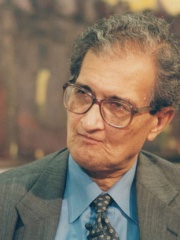
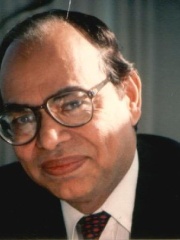
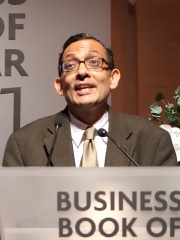
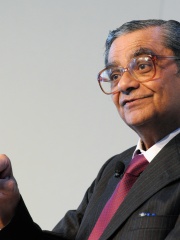
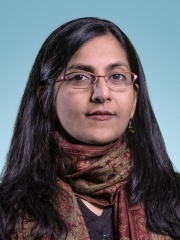
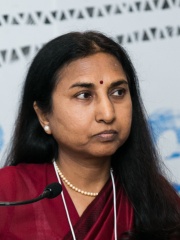
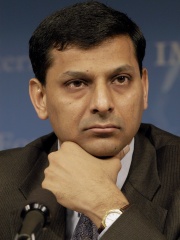
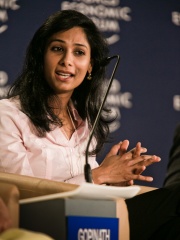
The Most Famous
ECONOMISTS from India
This page contains a list of the greatest Indian Economists. The pantheon dataset contains 414 Economists, 9 of which were born in India. This makes India the birth place of the 9th most number of Economists behind Poland, and Canada.
Top 9
The following people are considered by Pantheon to be the most legendary Indian Economists of all time. This list of famous Indian Economists is sorted by HPI (Historical Popularity Index), a metric that aggregates information on a biography's online popularity.

1. Amartya Sen (b. 1933)
With an HPI of 73.57, Amartya Sen is the most famous Indian Economist. His biography has been translated into 87 different languages on wikipedia.
Amartya Kumar Sen (Bengali: [ˈɔmortːo ˈʃen]; born 3 November 1933) is an Indian economist and philosopher. Sen has taught and worked in England and the United States since 1972. In 1998, Sen received the Nobel Prize in Economic Sciences for his contributions to welfare economics. He has also made major scholarly contributions to social choice theory, economic and social justice, economic theories of famines, decision theory, development economics, public health, and the measures of well-being of countries. Sen is currently the Thomas W. Lamont University Professor, and Professor of Economics and philosophy, at Harvard University. He previously served as Master of Trinity College at the University of Cambridge. In 1999, he received India's highest civilian honour, Bharat Ratna, for his contribution to welfare economics. The German Publishers and Booksellers Association awarded him the 2020 Peace Prize of the German Book Trade for his pioneering scholarship addressing issues of global justice and combating social inequality in education and healthcare.

2. Mahbub ul Haq (1934 - 1998)
With an HPI of 60.62, Mahbub ul Haq is the 2nd most famous Indian Economist. His biography has been translated into 29 different languages.
Mahbub ul-Haq (Urdu: محبوب الحق; (1934-02-24)24 February 1934 – (1998-07-16)16 July 1998) was a Pakistani economist, international development theorist, and politician who served as the minister of Finance from 10 April 1985 to 28 January 1986, and again from June to December 1988 as a caretaker. Regarded as one of the greatest economists of his time, Haq devised the Human Development Index, widely used to gauge the development of nations. After graduating with a degree in economics from the Government College University in Lahore, he won a scholarship to the University of Cambridge in England, where he obtained a second higher degree in the same field. He later received his PhD from Yale University in the United States and conducted postdoctoral research at the Harvard Kennedy School. Haq returned to Pakistan to serve as the chief economist of the Planning Commission throughout the 1960s. In 1970, after the fall of Ayub Khan, Haq moved to Washington, D.C. to serve at the World Bank as Director of Policy Planning until 1982, where he played a major role in reorienting its approach to assisting development in low-income countries. He returned to Pakistan in 1982, and in 1985 assumed the position of Finance Minister with the Government of Pakistan, and oversaw a period of economic liberalization in the country. In 1989, he moved back to the United States, where he served as the special adviser to the United Nations Development Programme (UNDP) under its head, William Henry Draper III. At the UNDP, Haq led the establishment of the Human Development Report and the widely-respected Human Development Index (HDI), which measures development by well-being, rather than by financial income alone. He returned to Pakistan in 1996 to establish the Human Development Centre in the capital city of Islamabad. Haq is considered to have had a profound effect on global development. His 1995 book, Reflections on Human Development, is said to have opened new avenues to policy proposals for human development paradigms, such as the United Nations Global Compact that was formed in 2000. Amartya Sen and Tam Dalyell judged Haq's work to have "brought about a major change in the understanding and statistical accounting of the process of development". The Economist called him "one of the visionaries of international development". He was widely regarded as "the most articulate and persuasive spokesman for the developing world".

3. Abhijit Banerjee (b. 1961)
With an HPI of 56.39, Abhijit Banerjee is the 3rd most famous Indian Economist. His biography has been translated into 54 different languages.
Abhijit Vinayak Banerjee (Bengali pronunciation: [oβid͡ʒit bænard͡ʒi]; born 21 February 1961) is an Indian American economist who is currently the Ford Foundation International Professor of Economics at the Massachusetts Institute of Technology. He is co-founder and co-director of the Abdul Latif Jameel Poverty Action Lab (J-PAL), an MIT based global research center promoting the use of scientific evidence to inform poverty alleviation strategies. In 2019, Banerjee shared the Nobel Memorial Prize in Economic Sciences with Esther Duflo and Michael Kremer, "for their experimental approach to alleviating global poverty." He and Esther Duflo are married, and became the sixth married couple to jointly win a Nobel or Nobel Memorial Prize. In addition to his academic appointments, Banerjee is a fellow of the Econometric Society, a member of the National Academy of Sciences, and a fellow of the American Academy of Arts and Sciences. In 1994, he received a Sloan Research Fellowship, awarded annually to early career researchers with the "potential to revolutionize their fields." According to Research Papers in Economics, Banerjee is among the most productive development economists in the world, ranking in the top 75 researchers by total research output.

4. Jagdish Bhagwati (b. 1934)
With an HPI of 53.06, Jagdish Bhagwati is the 4th most famous Indian Economist. His biography has been translated into 23 different languages.
Jagdish Natwarlal Bhagwati (born July 26, 1934) is an Indian-born naturalized American economist and trade theorist. He is a University Professor of economics and law at Columbia University and a Senior Fellow in International Economics at the Council on Foreign Relations. He has made contributions to international trade theory and economic development. He had a chair named after him while he was still teaching at the university. He is one of only 10 scholars who hold the title of University Professor at Columbia University. Bhagwati is the recipient of the Order of the Rising Sun, Padma Vibhushan, Frank Seidman Distinguished Award in Political Economy and the Freedom Prize of Switzerland. In 2014, the Financial Times called him "one of the most outstanding economists of his generation never to have won the Nobel Prize". This view is shared by his peers including Nobel Prize winning economist Paul Krugman, "The crucial point for me is that people didn't understand at all clearly how distortions in a trading economy relate to policy before Jagdish spelled it out. Once he did, it became so clear that it was hard to believe that someone had to point it out. In my view, that makes his work Nobel-worthy."
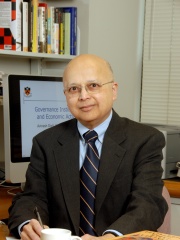
5. Avinash Dixit (b. 1944)
With an HPI of 50.91, Avinash Dixit is the 5th most famous Indian Economist. His biography has been translated into 18 different languages.
Avinash Kamalakar Dixit (born 6 August 1944) is an Indian-American economist. He is the John J.F. Sherrerd '52 University Professor of Economics Emeritus at Princeton University, and has been distinguished adjunct professor of economics at Lingnan University (Hong Kong), senior research fellow at Nuffield College, Oxford and Sanjaya Lall Senior Visiting Research Fellow at Green Templeton College, Oxford.

6. Kshama Sawant (b. 1973)
With an HPI of 47.41, Kshama Sawant is the 6th most famous Indian Economist. Her biography has been translated into 16 different languages.
Kshama Sawant ( kə-SHUM-ah sah-WUNT; born October 17, 1973) is an Indian-American politician and economist who served on the Seattle City Council from 2014 to 2024. She was a member of Socialist Alternative and the first and only member of the party to date to be elected to public office, until part of the party split to found Revolutionary Workers. A former software engineer, Sawant became an economics instructor in Seattle after immigrating to the United States from her native India. She ran unsuccessfully for the Washington House of Representatives in 2012 before winning her seat on the Seattle City Council in 2013. She was the first socialist to win a citywide election in Seattle since Anna Louise Strong was elected to the school board in 1916. Sawant narrowly survived a December 7, 2021 recall election for her position on the council by a margin of 310 votes, or 0.76%. It was the first held in Seattle since 1975. In January 2023, Sawant announced that she would not seek re-election, and would instead promote the Socialist Alternative campaign Workers Strike Back to unionize workers. In 2024, Sawant announced she had left Socialist Alternative and formed her own party Revolutionary Workers. She launched her candidacy for the 2026 United States House of Representatives election in Washington's 9th congressional district as an independent in June 2025.

7. Bina Agarwal (b. 1951)
With an HPI of 45.70, Bina Agarwal is the 7th most famous Indian Economist. Her biography has been translated into 19 different languages.
Bina Agarwal is an Indian development economist and Professor of Development Economics and Environment at the Global Development Institute at The University of Manchester. She has written extensively on land, livelihoods and property rights; environment and development; the political economy of gender; poverty and inequality; legal change; and agriculture and technological transformation. She is the author of a book, A Field of One's Own: Gender and Land Rights in South Asia, which has had an impact on governments, NGOs, and international agencies in promoting women's rights in land and property. This work has also inspired research in Latin America and globally.

8. Raghuram Rajan (b. 1963)
With an HPI of 45.02, Raghuram Rajan is the 8th most famous Indian Economist. His biography has been translated into 31 different languages.
Raghuram Govind Rajan (born 3 February 1963) is an Indian economist and the Katherine Dusak Miller Distinguished Service Professor of Finance at the University of Chicago's Booth School of Business. He served as the Chief Economist of the International Monetary Fund from 2003 to 2006 and the 23rd Governor of the Reserve Bank of India from 2013 to 2016. In 2015, during his tenure at the RBI, he became the Vice-Chairman of the Bank for International Settlements. At the 2005 Federal Reserve annual Jackson Hole conference, three years before the 2008 financial crisis, Rajan warned about the growing risks in the financial system, that a financial crisis could be in the offing, and proposed policies that would reduce such risks. Former U.S. Treasury Secretary Lawrence Summers called the warnings "misguided" and Rajan himself a "luddite". However, after the 2008 financial crisis, Rajan's views came to be seen as prescient, and he was extensively interviewed for the Academy Awards-winning documentary Inside Job (2010). In 2003, Rajan received the inaugural Fischer Black Prize, given every two years by the American Finance Association to the financial economist younger than 40 who has made the most significant contribution to the theory and practice of finance. His book, Fault Lines: How Hidden Fractures Still Threaten the World Economy, won the Financial Times/Goldman Sachs Business Book of the Year award in 2010. In 2016, he was named by Time in its list of the '100 Most Influential People in the World'.

9. Gita Gopinath (b. 1971)
With an HPI of 44.54, Gita Gopinath is the 9th most famous Indian Economist. Her biography has been translated into 30 different languages.
Gita Gopinath (born 8 December 1971) is an Indian-American economist who is currently serving as the Gregory and Ania Coffey professor of Economics at Harvard University and previously served as the first deputy managing director of the International Monetary Fund (IMF), from 21 January 2022 to 31 August 2025. Before that she also served as chief economist of the IMF between 2019 and 2022. Prior to joining the IMF, Gopinath had a two-decade-long career as an academic including at the economics department of Harvard University, where she was the John Zwaanstra Professor of International Studies and Economics (2005–2022), and earlier an assistant professor at the University of Chicago Booth School of Business (2001–05). She is also a co-director of the international finance and macroeconomics program at the National Bureau of Economic Research and has earlier worked as the honorary economic adviser to the chief minister of Kerala. Gita Gopinath was appointed as chief economist of the IMF in October 2018 by its managing director Christine Lagarde. In an interview with Trevor Noah on The Daily Show, she named the worldwide recession of 2020 as "the Great Lockdown". In December 2021, IMF managing director Kristalina Georgieva appointed her the first deputy managing director of the IMF, which is the organization's second-in-command position. Gopinath will leave the IMF by the end of August 2025 to rejoin Harvard as the inaugural Gregory and Ania Coffey Professor of Economics in the Department of Economics.
People
Pantheon has 9 people classified as Indian economists born between 1933 and 1973. Of these 9, 8 (88.89%) of them are still alive today. The most famous living Indian economists include Amartya Sen, Abhijit Banerjee, and Jagdish Bhagwati. The most famous deceased Indian economists include Mahbub ul Haq.
Living Indian Economists
Go to all RankingsAmartya Sen
1933 - Present
HPI: 73.57
Abhijit Banerjee
1961 - Present
HPI: 56.39
Jagdish Bhagwati
1934 - Present
HPI: 53.06
Avinash Dixit
1944 - Present
HPI: 50.91
Kshama Sawant
1973 - Present
HPI: 47.41
Bina Agarwal
1951 - Present
HPI: 45.70
Raghuram Rajan
1963 - Present
HPI: 45.02
Gita Gopinath
1971 - Present
HPI: 44.54

